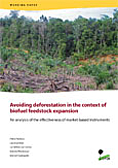Avoiding deforestation in the context of biofuel feedstock expansion
-----------------
This report assesses the potential effectiveness of market-based instruments in ensuring that biofuel feedstock development does not expand in detriment of natural forests. We employ a detailed literature review, including a look at select case studies, to evaluate the effectiveness of three main types of instruments: - those governing production practices and access to markets; - those governing the provision of finance for biofuel feedstock production and processing; and - those aiming to safeguard environmental services emanating from forestlands which could be threatened by the expansion of biofuel feedstock. No single instrument is likely to ensure that biofuel development will reduce its potential pressure on forests hence avoiding deforestation. A host of complementary mechanisms will be needed to achieve this aim. Additionally, for any measure to make a difference in avoiding deforestation, it must matter in economic terms so that it shapes everyday practices of landholders and biofuel companies in meaningful ways. For this change to occur, it must be accompanied by measurable and verifiable indicators and conditionalities and – often – complementary state regulatory functions. In many contexts, this will in turn imply strengthening the overall governance system in which the different instruments are embedded. There is a need to build greater synergies both between different marketbased instruments themselves and between these instruments and state regulatory frameworks at various scales.
Pages: 36p.
Publisher: Center for International Forestry Research (CIFOR), Bogor, Indonesia
Publication Year: 2011
Language: English
---------------


